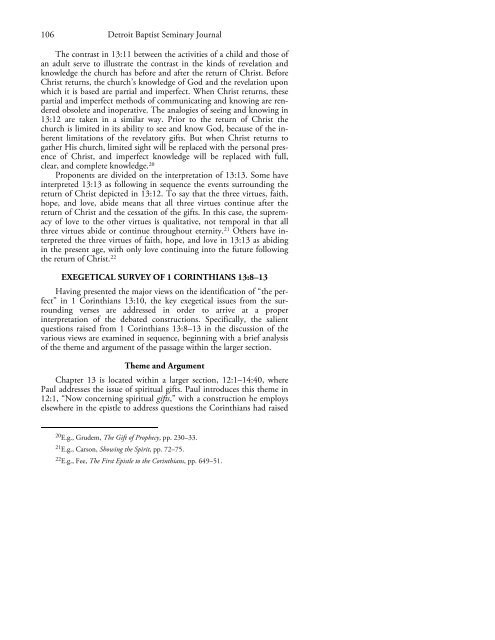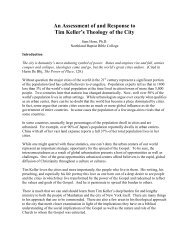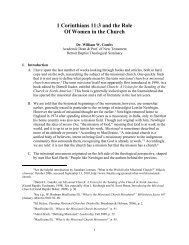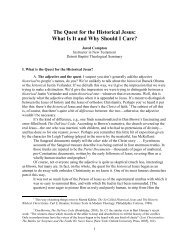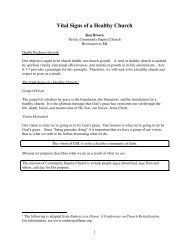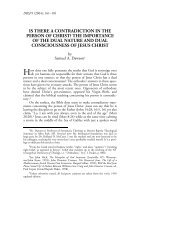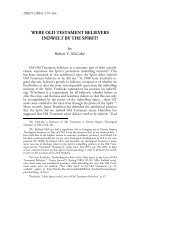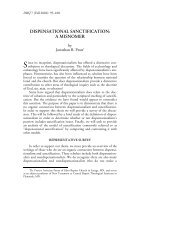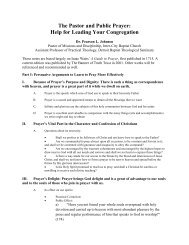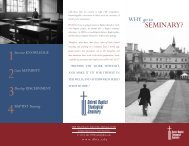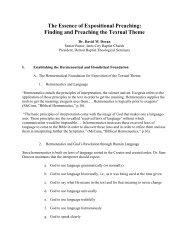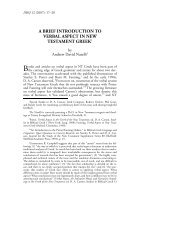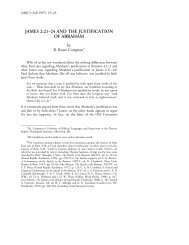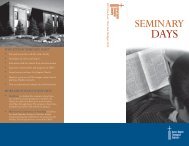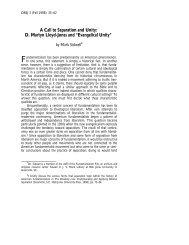106 Detroit Baptist Seminary JournalThe contrast in <strong>13</strong>:11 between <strong>the</strong> activities <strong>of</strong> a child <strong>and</strong> those <strong>of</strong>an adult serve to illustrate <strong>the</strong> contrast in <strong>the</strong> kinds <strong>of</strong> revelation <strong>and</strong>knowledge <strong>the</strong> church has before <strong>and</strong> after <strong>the</strong> return <strong>of</strong> Christ. BeforeChrist returns, <strong>the</strong> church’s knowledge <strong>of</strong> God <strong>and</strong> <strong>the</strong> revelation uponwhich it is based are partial <strong>and</strong> imperfect. When Christ returns, <strong>the</strong>separtial <strong>and</strong> imperfect methods <strong>of</strong> communicating <strong>and</strong> knowing are renderedobsolete <strong>and</strong> inoperative. The analogies <strong>of</strong> seeing <strong>and</strong> knowing in<strong>13</strong>:12 are taken in a similar way. Prior to <strong>the</strong> return <strong>of</strong> Christ <strong>the</strong>church is limited in its ability to see <strong>and</strong> know God, because <strong>of</strong> <strong>the</strong> inherentlimitations <strong>of</strong> <strong>the</strong> revelatory gifts. But when Christ returns toga<strong>the</strong>r His church, limited sight will be replaced with <strong>the</strong> personal presence<strong>of</strong> Christ, <strong>and</strong> imperfect knowledge will be replaced with full,clear, <strong>and</strong> complete knowledge. 20Proponents are divided on <strong>the</strong> interpretation <strong>of</strong> <strong>13</strong>:<strong>13</strong>. Some haveinterpreted <strong>13</strong>:<strong>13</strong> as following in sequence <strong>the</strong> events surrounding <strong>the</strong>return <strong>of</strong> Christ depicted in <strong>13</strong>:12. To say that <strong>the</strong> three virtues, faith,hope, <strong>and</strong> love, abide means that all three virtues continue after <strong>the</strong>return <strong>of</strong> Christ <strong>and</strong> <strong>the</strong> cessation <strong>of</strong> <strong>the</strong> gifts. In this case, <strong>the</strong> supremacy<strong>of</strong> love to <strong>the</strong> o<strong>the</strong>r virtues is qualitative, not temporal in that allthree virtues abide or continue throughout eternity. 21 O<strong>the</strong>rs have interpreted<strong>the</strong> three virtues <strong>of</strong> faith, hope, <strong>and</strong> love in <strong>13</strong>:<strong>13</strong> as abidingin <strong>the</strong> present age, with only love continuing into <strong>the</strong> future following<strong>the</strong> return <strong>of</strong> Christ. 22EXEGETICAL SURVEY OF 1 CORINTHIANS <strong>13</strong>:8–<strong>13</strong>Having presented <strong>the</strong> major views on <strong>the</strong> identification <strong>of</strong> “<strong>the</strong> perfect”in 1 <strong>Corinthians</strong> <strong>13</strong>:10, <strong>the</strong> key exegetical issues from <strong>the</strong> surroundingverses are addressed in order to arrive at a properinterpretation <strong>of</strong> <strong>the</strong> debated constructions. Specifically, <strong>the</strong> salientquestions raised from 1 <strong>Corinthians</strong> <strong>13</strong>:8–<strong>13</strong> in <strong>the</strong> discussion <strong>of</strong> <strong>the</strong>various views are examined in sequence, beginning with a brief analysis<strong>of</strong> <strong>the</strong> <strong>the</strong>me <strong>and</strong> argument <strong>of</strong> <strong>the</strong> passage within <strong>the</strong> larger section.Theme <strong>and</strong> ArgumentChapter <strong>13</strong> is located within a larger section, 12:1–14:40, wherePaul addresses <strong>the</strong> issue <strong>of</strong> spiritual gifts. Paul introduces this <strong>the</strong>me in12:1, “Now concerning spiritual gifts,” with a construction he employselsewhere in <strong>the</strong> epistle to address questions <strong>the</strong> <strong>Corinthians</strong> had raised20 E.g., Grudem, The Gift <strong>of</strong> Prophecy, pp. 230–33.21 E.g., Carson, Showing <strong>the</strong> Spirit, pp. 72–75.22 E.g., Fee, The First Epistle to <strong>the</strong> <strong>Corinthians</strong>, pp. 649–51.
1 <strong>Corinthians</strong> <strong>13</strong>:8–11 107in a previous correspondence. 23 At <strong>the</strong> same time, <strong>the</strong> impressiongained from reading <strong>the</strong>se chapters is that Paul is responding not onlyto questions raised by <strong>the</strong> Corinthian church but also to problemswithin <strong>the</strong> church on <strong>the</strong> use or misuse <strong>of</strong> spiritual gifts. Thus, in <strong>the</strong>sechapters Paul is both answering questions <strong>and</strong> endeavoring to correctproblems within <strong>the</strong> Corinthian church on <strong>the</strong> matter <strong>of</strong> spiritualgifts. 24The general development <strong>of</strong> Paul’s argument in <strong>the</strong>se chapters appearsfairly straightforward. Paul begins in chapter 12 by discussing <strong>the</strong>diversity <strong>of</strong> spiritual gifts <strong>and</strong> <strong>the</strong> unity <strong>of</strong> believers in <strong>the</strong> body <strong>of</strong>Christ. Chapter <strong>13</strong> stresses <strong>the</strong> importance <strong>of</strong> love in <strong>the</strong> exercise <strong>of</strong>spiritual gifts. Paul <strong>the</strong>n concludes in chapter 14 by arguing, first, for<strong>the</strong> preeminence <strong>of</strong> prophecy over tongues in edifying <strong>the</strong> church <strong>and</strong>,second, for orderliness in public worship. 25 Looking specifically at chapter<strong>13</strong> <strong>and</strong> Paul’s discussion on <strong>the</strong> importance <strong>of</strong> love, Paul developshis argument in three sections. He starts in <strong>13</strong>:1–3 by showing <strong>the</strong> necessity<strong>of</strong> love in <strong>the</strong> exercise <strong>of</strong> spiritual gifts. Following this, he givesan extended description <strong>of</strong> <strong>the</strong> nature <strong>and</strong> character <strong>of</strong> love in <strong>13</strong>:4–7.Then, in <strong>13</strong>:8–<strong>13</strong>, he concludes by underscoring <strong>the</strong> permanence <strong>of</strong>love. 2623 The new section is marked <strong>of</strong>f by <strong>the</strong> phrase “now concerning” (peri; dev) <strong>and</strong> <strong>the</strong>vocative “brethren” (ajdelfoiv) at <strong>the</strong> beginning <strong>of</strong> 12:1. The phrase “now concerning” isused by Paul to address issues <strong>the</strong> <strong>Corinthians</strong> had raised in a previous letter to <strong>the</strong>apostle (cf. 7:1; 8:1; 16:1). The plural substantival adjective “spiritual”(tw'n pneumatikw'n) in 12:1 could be ei<strong>the</strong>r masculine, “those who are spiritual,” or neuter,“spiritual gifts.” The majority <strong>of</strong> interpreters take it as <strong>the</strong> latter in light <strong>of</strong> <strong>the</strong> overallemphasis in <strong>the</strong> section on gifts, <strong>the</strong> clear instance <strong>of</strong> <strong>the</strong> neuter plural in 14:1referring to spiritual gifts, <strong>and</strong> <strong>the</strong> parallel use <strong>of</strong> <strong>the</strong> synonym “gifts” (carismavtwn) in12:4 <strong>and</strong> elsewhere. See <strong>the</strong> discussion in Fee, The First Epistle to <strong>the</strong> <strong>Corinthians</strong>,pp. 570, 575–76.24 As Fee notes, “On <strong>the</strong> basis <strong>of</strong> chap. 12 alone, one might think that <strong>the</strong>y wereasking questions about spiritual gifts; but chap. 14 indicates that, as throughout <strong>the</strong>letter, Paul’s answer is intended to be corrective, not instructional or informational”(The First Epistle to <strong>the</strong> <strong>Corinthians</strong>, p. 570).25 Similarly Fee, The First Epistle to <strong>the</strong> <strong>Corinthians</strong>, pp. 569–74. For recent treatment<strong>of</strong> <strong>the</strong>se chapters from literary <strong>and</strong> rhetorical analysis, including bibliographies,see Raymond F. Collins, First <strong>Corinthians</strong>, Sacra Pagina (Collegeville, MN: LiturgicalPress, 1999), pp. 441–44; Anthony C. Thiselton, The First Epistle to <strong>the</strong> <strong>Corinthians</strong>: ACommentary on <strong>the</strong> Greek Text, New International Greek Testament Commentary(Gr<strong>and</strong> Rapids: Eerdmans, 2000), pp. 902–7. A number <strong>of</strong> <strong>the</strong>se studies have identifieda macro-chiasm for this section. Paul lays <strong>the</strong> foundation for his response in 12:1–30 byaddressing both <strong>the</strong> diversity <strong>of</strong> gifts <strong>and</strong> <strong>the</strong> unity <strong>of</strong> believers (A); he turns aside for amoment in something <strong>of</strong> a digression in <strong>13</strong>:1–<strong>13</strong> to develop <strong>the</strong> necessity <strong>of</strong> love inrelationship to <strong>the</strong> gifts (B); he returns to his argument in 14:1–40 by discussing <strong>the</strong>importance <strong>of</strong> mutual edification <strong>and</strong> <strong>the</strong> need for proper order in <strong>the</strong> exercise <strong>of</strong> <strong>the</strong>gifts (A 1 ). See <strong>the</strong> discussion in Fee, The First Epistle to <strong>the</strong> <strong>Corinthians</strong>, pp. 571–72.26 See, for example, C. K. Barrett, A Commentary on <strong>the</strong> First Epistle to <strong>the</strong>


